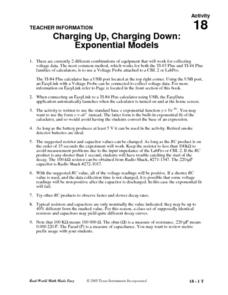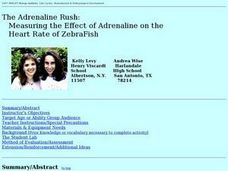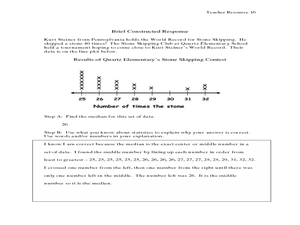Curated OER
Is the Hudson River Too Salty to Drink?
Students explore reasons for varied salinity in bodies of water. In this geographical inquiry lesson, students use a variety of visual and written information including maps, data tables, and graphs, to form a hypothesis as to why the...
Curated OER
Kevin's Camp Schedule
In this elapsed time worksheet, students study a camp schedule of activities. Students solve 5 story problems using the information in the table.
Curated OER
The Big Bang-Hubble's Law
In this Hubble's law instructional activity, learners use data for galaxies which include their distance and speed. Students make a graph to show the distance to each galaxy and the speed of each galaxy. They use their graph to answer 4...
Curated OER
Distribution of children living at home
Students use E-STAT to examine demographics. In this social demographics lesson, students use statistical data to determine if a particular family is in need of assistance. Students will discuss social and educational policies and...
Curated OER
Analyzing the Job Market for Babysitting in Your Neighborhood
Students conduct research on a neighborhood in Canada. In this data analysis lesson, students use data from the 2006 Canadian census to draw conclusions about a population group.
Curated OER
Static Electricity
In this static electricity worksheet, students experiment with balloons, plastic bags and flannel clothes to observe attraction and repulsion of objects. Students complete three data tables indicating the charge on the objects and if...
Curated OER
Charging Up, Charging Down
Learners collect and analyze voltage data. Then, they investigate exponential functions using the TI and a Voltage Probe and graph their data and analyze it using a table.
Curated OER
How Much are You Worth?
In this body elements worksheet, students use a table given the percentage of each element that composes the body to find their worth. The value of each element is given and students calculate what their bodies would be worth if they...
Curated OER
Measuring the Effect of Adrenaline on the Heart Rate of Zebra Fish
Students investigate the heart beat of zebra fish in timed intervals. They record the heart beats and average three counts to display in their data tables. They repeat these steps increasing the adrenaline solution.
Curated OER
Average Atomic Masses Homework
For this average atomic masses worksheet, high schoolers solve 3 problems. They find the average atomic mass using data from a mass spectrometer, they find the average atomic mass of an element using isotope information and they explain...
Curated OER
Counting Squares
For this counting squares worksheet, students solve 2 problems that include counting 2 different sets of squares. First, they draw a picture of four squares arranged in two rows of two. Then, students determine the total number of...
Curated OER
The Accuracy of Climate Data
Students use maps to determine how accurate climate data really is. They also answer questions using a table of data.
Curated OER
Solving Equations with a Table
In this solving equations with a table worksheet, 6th graders use the data in the table to solve seven problems, completing the table as they work.
Curated OER
Rouge River Data
Students participate in using Excel sofware in order to create graphs. They create the graphs using data that they gathered during the Rouge River Field Trip they attended. The produce bar graphs from the excel spreadsheets.
Curated OER
Histograms and Frequency Tables
In this statistics learning exercise, students solve and analyze graphs. They use histograms and frequency tables to solve their problems. There are 2 multiple choice questions with an answer key.
University of Georgia
Energy Content of Foods
Why do athletes load up on carbohydrates the evening before a competition? The lesson helps answer this question as it relates the type of food to the amount of energy it contains. After a discussion, scholars perform an experiment to...
National Security Agency
Are You Ready to Call the Guinness Book of Records?
Learners design questions that can be answered by collecting data. In this line-plot lesson, pupils collect data and graph on a line plot on world records. An abundant supply of teacher support is provided in this resource.
Curated OER
Mineral Matters
Students work in a team to use the ProScope Digital USB Microscope and a computer to collect microscopic images from a variety of mineral specimens. They compare specimens and determine how they are alike and different by comparing their...
Curated OER
Math Investigations 2
Young mathematicians practice measuring and graphing skills while working in groups to measure objects found in the classroom. Using their measurements, they create one bar graph displaying the lengths and another displaying the widths.
Curated OER
Proofreading, Revising, & Editing Skills Success
Some self-paced writing resources are just better than others. This one is great. The 205-page packet includes exercises on every aspect of the writing process, from crafting sentences and paragraphs, to proofreading, revising, and...
Texas State Energy Conservation Office
Nuts! Calculating Thermal Efficiency
Oh nuts! Do macadamias or almonds produce more thermal energy? Energy enthusiasts find out with this experiment. The objective is to demonstrate to your class how the chemical energy contained in foods can be converted into useable...
Fluence Learning
Writing an Opinion: Buddies that Bark or Purr-fect Pets?
Which animal is best for you—a dog or cat? Why? Engage third graders in an opinion writing assessment that prompts them to read facts about both pets, and then write and decide which pet is best for them.
Perkins School for the Blind
Friction
Friction is a force that can be felt, which means that learners with visual impairments can experiment to feel and understand the concept of friction. They slide a rock along a smooth table, and then they slide a rock across sandpaper,...
Balanced Assessment
Survey Says
Examine statistical data that shows an overlap in responses. The data tallies over 100% and learners interpret this data characteristic. They then create a graph to represent the data.

























